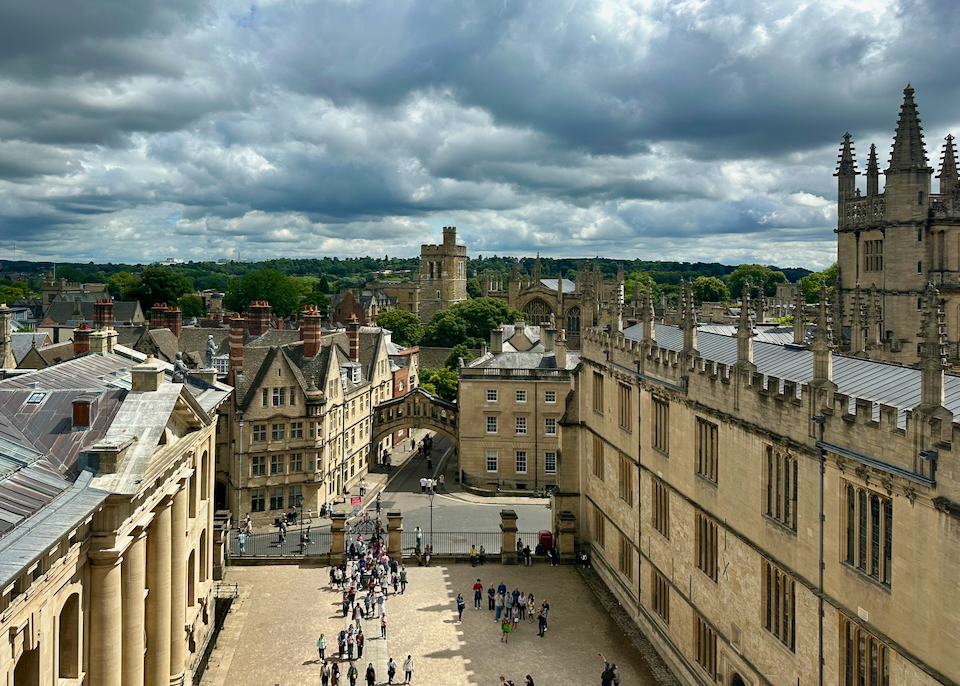
View over Oxford University from the Sheldonian Theatre – with the Old Bodleian Library on the right. The best luxury hotel near here is the Old Bank, whose great location and historic charm make it our favorite hotel in Oxford.
The Best Areas to Stay in Oxford
Oxford is undoubtedly one of the dreamiest cities on the planet. Not only is it surreal to wander the same hallowed streets as so many people who have changed the world, but everywhere also feels vaguely familiar thanks to the city’s starring role in many film and TV classics – most famously, Inspector Morse and Harry Potter. Another otherworldly feature of the city is its situation, wedged between two picturesque rivers, the Cherwell and the Thames (better known as the Isis in these parts), and several other tributaries and canals. Wandering the meadows, plains, and parks along the waterways is one of the city’s great joys.
The peaceful Oxford Botanic Garden is beautiful in early summer, and was one of the highlights of our latest trip.
But of course, most people will come to see the City Center which is dominated by the University of Oxford. The stellar sights include those that not only hold significant academic relevance but which are so fantastically beautiful they doubled as Hogwarts School in the Harry Potter films. The Bodleian Libraries and Christ Church College tick both of these boxes and if you only have a short time in the city, they are undoubtedly the two places you cannot miss. Other central colleges of note, with particular historical or architectural importance, include Magdalen (which you’ll quickly learn is pronounced ‘Maud-lin’), Merton, Queen’s, Balliol, New, Exeter, and Trinity (among many others). The University also has a beautiful Botanic Garden & Arboretum; a church, St Mary the Virgin, whose tower gives you the highest views of the city; and the famous Sheldonian Theatre, whose cupola has to be seen (and scaled) to be believed. Other sights include Oxford Castle & Prison, some of which dates back to the 11th century, and the Covered Market, where you’ll find great street food, coffee, quirky artisanal makers, and local produce.
Just north of the city center lies the neighborhoods of Jericho and the University’s Science Area, which hold the city’s other main superstar attractions: the Ashmolean Museum of Art and Archaeology, the Pitt Rivers Museum, and the Museum of Natural History. A visit to any of these museums, all managed by the University, will blow you away. They are simply three of the best museums in the country, and the Ashmolean and Pitt Rivers are unique worldwide for their awesome collections. Jericho borders the canal and leads north to the unbroken skyline of the enormous Port Meadow by the River Thames, while the Science Area boasts the University Parks as a huge recreation ground on the River Cherwell.
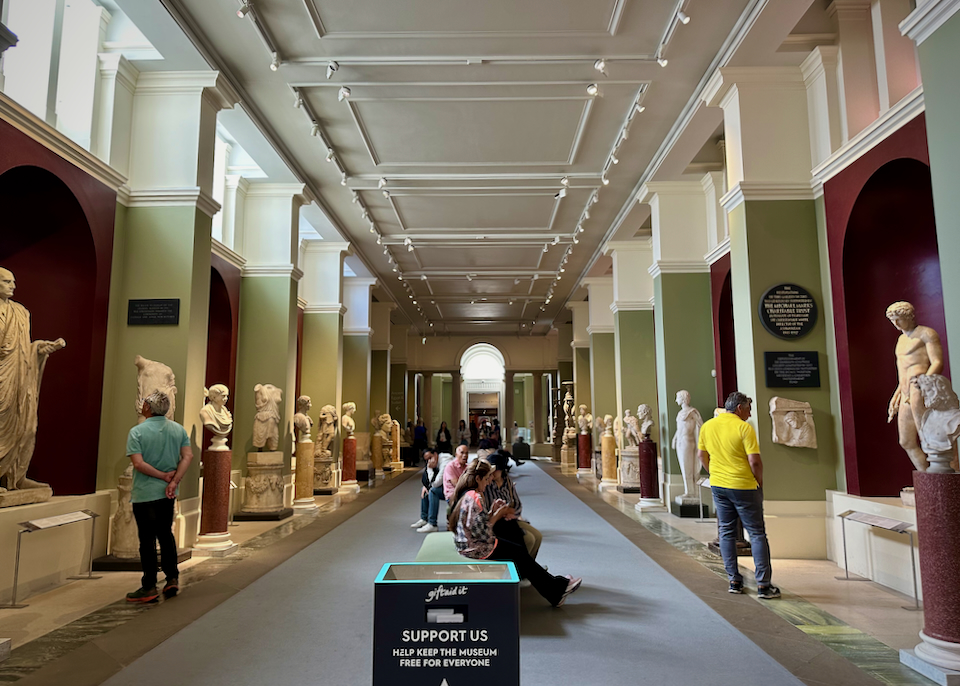
If you visit only one museum while you’re in Oxford, make it the Ashmolean.
These neighborhoods lead north to genteel Summertown, famously home to one of the city’s most well-known sons, JRR Tolkien (whose grave is just north of here in Wolvercote). Its high street has a great mix of fancy boutiques and restaurants with thrift stores and places to hunt out a bargain. There are lots of B&Bs around here, some with a bit more space than their City Center neighbors (as well as more chance of parking), which makes it a good place to stay if you’re here for a while or with kids. It’s an easy 15-minute bus ride to the big museums and a short walk to the River Thames and Port Meadow or the River Cherwell.
Leading southeast out of the City Center is Cowley Road, best known for its several world-food restaurants, bars, and stores selling specialty foodstuffs. However, Oxford’s soaring rents have made the streets around here – just a short walk from Magdalen College – a very unattractive option, and this gentrification is fast-changing the mix in this once-diverse part of town. Nevertheless, it’s a great place to head to if you’re not sure what kind of food you want: within a few minutes’ walk, you’ll pass by excellent options from every corner of the globe. Thanks to this mixture, this neighborhood makes a great antidote as a base if the impossible prettiness of Oxfordshire and the Cotswolds is getting a bit too much for you. Alternatively, if you can’t get enough of Oxford’s fairytale feel, Cowley Road is still a great base as you’re near enough to the great punting around Magdalen College and beautiful river walks where the Cherwell and Thames collide below Christ Church Meadow.
The Best Places to Stay in Oxford
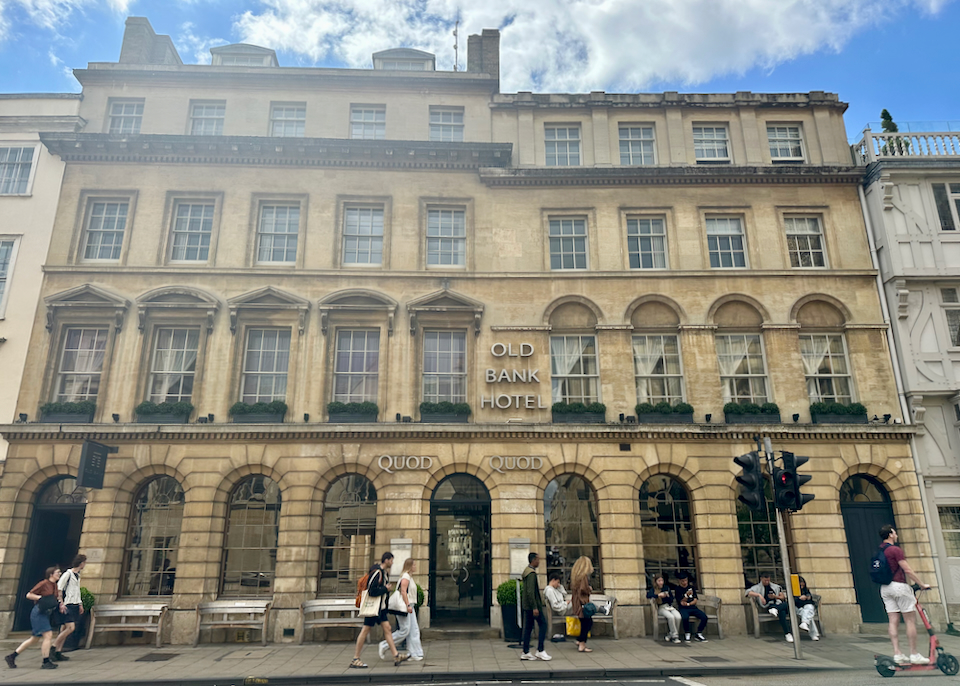
The centrally-located and historic Old Bank is the best luxury hotel in Oxford.
- Best Luxury Hotels in Oxford
Old Bank • Randolph • Old Parsonage- Best Boutique Hotels in Oxford
Vanbrugh House • Head of the River • Burlington House- Best Cheap Hotels in Oxford
Tower House • Central Backpackers • St. Margaret’sBest Areas in Oxford for…
- Best Area in Oxford for Sightseeing: City Center
Thanks to the city’s odd shape, squeezed between two rivers and bulging out around the edges, the City Center really is the focal point of everything. The town grew up around its great University of Oxford, which is still the main attraction for most people visiting the town. There are so many different colleges and academic buildings that the whole City Center is essentially a big campus – it’s impossible to miss seeing a lot of it as you walk around – but you’ll want to go in at least a few to see their magnificent architecture, collections of antiquities, graceful quads, and bucolic grounds. Most popular are Christ Church college and the Old Bodleian Library, which are not only some of the oldest and most beautiful of the university buildings, but have also featured heavily in a certain series of films about a young wizard.To the east of the center, don’t miss Magdalen and Merton colleges; in good weather, the Botanic Garden & Arboretum is wonderful too. Most people will want to stroll down Broad Street, past the Sheldonian Theatre, the Museum of the History of Science, and the epic bookstore, Blackwell’s. On the city center’s western edge, head for the Castle Quarter. And in the center of it all, you’ll find the Covered Market – a neat place to refuel.
Magdalen College in early summer
- Best Area in Oxford for Nightlife: Jericho & Science Area
Oxford is not known for its wild nightlife: don’t expect a great nightclub scene. But, as a student town, there’s plenty of theater, music, and trivia nights, and as a British country town, Oxford more than meets the mandatory minimum for historic pubs. There’s a bit of everything in the City Center, and trendy Jericho and the nearby Science Area are great for a pub crawl to live like a local for the evening. The most noteworthy pubs to hit include: the Eagle and Child, a favorite of CS Lewis and JRR Tolkien; the Lamb and Flag opposite, with its wood paneling and open fire; and the Old Bookbinders, which has low ceilings, curios covering every surface, and surprisingly great food.- Best Area in Oxford for Food and Restaurants: City Center
Oxford is a heaven for foodies, partly because it is eminently walkable and partly because, thanks to the large student population, it is reasonably priced. While there’s great food to be found on the peripheries, the City Center has a bit of everything. For street food and gourmet produce any day of the week, head to the Covered Market. There are also great food stalls at Gloucester Green’s various markets, which run Wednesday-Saturday. There are two cafes opposite each other on the High Street claiming to be the oldest coffee shop in England (or Europe); fine dining at Quod, The Ivy, or No. 1 Ship Street; and some of the best pub food, like the pies at The Head of the River, which is also a great spot with a riverside terrace, as is The Folly, almost opposite. The City Center also has great Japanese options, like the outpost of the wonderful tonkatsu ramen joint Shoryu and Edamamé for fantastic sushi.- Best Area in Oxford to Stay for First Timers: City Center
If you’re coming for the first time, the City Center has to be where you focus your attention. It has the most famous of the University of Oxford’s buildings (Christ Church college and the Bodleian Libraries, for example), most of the places made famous by TV and film, great eating and drinking options, and many of the oldest and most interesting sites, like the Oxford Castle & Prison. Even if you only wander the streets and don’t enter any of the colleges or museums, the City Center is so beautiful it’s like a film set, with higgledy-piggledy streets and wonky buildings. Plus, just north of the City Center are the two world-class museums, the Ashmolean and the Pitt Rivers, which would complete anyone’s to-do list for Oxford.

Inside atmospheric Christ Church College (not Hogwarts).
- Best Area in Oxford for Families: Summertown
Summertown is a great option not only because there are plenty of accommodation options, but also because they tend to be slightly more spacious than elsewhere and usually have a garden and parking. It’s a family-oriented area and the main drag has plenty of decent food places; thrift stores full of toys, books, and games; as well as a cute ceramics cafe and other places aimed at kids. It’s an enjoyable 10 to 15-minute ride on a double-decker bus from Summertown to museums as well as the City Center, and the neighborhood is a short walk from both of the rivers, Port Meadow, and University Parks. While the City Center will undoubtedly be where you’ll want to spend a lot of your time, you’ll be grateful to retreat to a more tranquil part of town to recharge.- Most Romantic Area in Oxford: Amid the “dreaming spires”
Many people have tried to capture the University of Oxford’s aesthetic appeal in words over the years. One that has stuck in our common imagination was Victorian poet Matthew Arnold’s evocative idea of the city’s “dreaming spires”. To best appreciate them, take to the skies with your date. Whether you scale the steps of the University Church’s tower, climb the Castle, shimmy around the Sheldonian, or go for a sundowner at the Varsity Club’s rooftop bar, you’ll be able to appreciate the pleasing uniformity of Oxford’s honey-colored stone, its magnificently carved cupolas, and the balance between man-made and nature that has been the backdrop to the formation of some of the world’s greatest minds.We found this dreamy view over the Oxford spires at the top of the Sheldonian Theatre.
- Best Area in Oxford for a Local Vibe: Anywhere outside the City Center
Cowley Road, Jericho, and Summertown are the three most popular neighborhoods after the City Center, and spending time in any of them will give you a good taste of local life. Cowley Road extends southeast from the High Street after Magdalen College and The Plain roundabout. It’s especially known for its array of world food restaurants. Jericho’s old workers’ cottages may have been gentrified long ago, but the neighborhood, tucked between the main road leading north out of town and the canal, has stayed off the main tourist trail despite being just north of the Ashmolean. It’s the best place in town to go for a pub crawl. You’d be forgiven for thinking that everyone in the chichi suburb of Summertown has time for a great meal, coffee, or drink, judging by the number of fancy restaurants, bars, and cafes. But spend a little more time here and you’ll see there are many thrift stores, community centers, and other activities going on that reveal that Oxford’s population is more diverse than first meets the eye.Burlington House is an excellent historic hotel just outside Oxford city center – ideal for travelers who prefer to be a bit removed from the action.
- Best Areas in Oxford for Walking: The city’s green spaces and waterways
Thanks to the University’s preservation of its open spaces, Oxford is one of the least city-like cities in the world, with shards of countryside and parkland running right into its heart. Most people who visit Christ Church will wander through its meadow, but take time to check out the adjacent Botanic Garden & Arboretum. Opposite the Botanic Garden, Magdalen College’s facade hides a verdant wonderland within where the River Cherwell cuts through the college’s large grounds (it’s a great place to go punting), which include forested areas and a deer park. If you’re interested in the further reaches of the town, make sure to go to University Parks on the River Cherwell or Port Meadow on the River Thames. The former is a pretty landscaped park, the latter is common grazing land whose eerie flatness and lack of trees can play tricks with your sense of perspective. Follow the waterways in and out of the city for idyllic cottages, people out on their boats, and university students racing in rowboats. And pray for good weather.- Safety in Oxford
Oxford is generally very safe for tourists. The biggest risk, as in most European cities, comes from pickpockets or muggers, but the likelihood of either of these things happening is low as long as you aren’t flashy with your possessions and keep an eye on what’s going on around you.The 8 Best Neighborhoods in Oxford for Tourists
1. Bodleian Libraries & Around
The Old Bodleian Library
The Bodleian Libraries, comprised of the Old Bodleian Library and the modern Weston Library, form the second largest library in Britain after the British Library. The Old Library is made up of many smaller parts: most famously the striking circular Radcliffe Camera, but also the intriguingly named Divinity School and the 15th-century Duke Humfrey’s Library, both of which featured in the Harry Potter films. You have to take a tour to see inside. Meanwhile, at the Weston on Broad Street, there’s an exhibition dedicated to the Bodleian’s most famous books and some of the scholars who have studied at the library. Look out too for the library’s Clarendon Building which was originally designed by Christopher Wren’s pupil Nicholas Hawksmoor as the official gateway to the University.
Other sights of interest nestled in amongst the library buildings include the publicly accessible tower at the University Church of St Mary the Virgin that provides the highest view over Oxford, as well as Hertford Bridge, better known as the Bridge of Sighs, opposite the library on Catte Street. It joins the two halves of Hertford College and resembles the Rialto Bridge in Venice.
- Best Hotels: Vanbrugh House • Old Bank • Randolph
- Best Cheap/Moderate Hotels: Tower House • Central Backpackers • Buttery
2. Broad Street to Gloucester Green
Gloucester Green
The Bodleian Library buildings mark the eastern end of Broad Street, one of the city’s most interesting thoroughfares. Down this end of “The Broad”, as it is known locally, is the Sheldonian Theatre, where the University’s graduation ceremonies are held. The main attractions of touring the 17th-century building include Christopher Wren’s ingenious engineering, the enormous ceiling mural, and the panoramic city views from the Cupola.
The famous mural on the ceiling of the Sheldonian Theatre, Triumph of Truth and Learning over Envy, Rapine and Ignorance, was painted by Robert Streater and dates to the 17th century.
Next door, don’t miss the Museum of the History of Science, which features many beautiful antiquities as well as more modern curios like a blackboard used by Einstein when he gave a lecture at the university and the original penicillin culture specimen. Opposite is Blackwell’s, a bookshop drenched in history, whose Norrington Room long held the world record as the single largest room in the world selling books – it’s quite a sight.
Blackwells Bookshop
Also along this street (or nearby) are Balliol, Exeter, and Trinity colleges, as well as the Oxfordshire Tourist Information Office and a bunch of cute stores and cafes. At the westernmost end, wind your way behind the stores to find Gloucester Green, a modern square that now hosts lively markets Wednesday-Saturday.
- Best Hotels: Old Bank • Vanbrugh House • Randolph
- Best Cheap/Moderate Hotels: Tower House • Central Backpackers • Buttery
3. Christ Church College & Around
Christ Church College gardens
Of all the colleges, the crown jewel for tourists is Christ Church. It not only is the most open to the public, with an art gallery, cathedral, meadow, and the bit most people are here for (even if they don’t admit it) – the Great Hall, otherwise known as Hogwarts’ dining room. If you’re into Renaissance painting, the Picture Gallery boasts works by Tintoretto and Michelangelo, among others.
The college’s main entrance is on St Aldate’s, which leads down to the picturesque Folly Bridge over the River Thames. Along the same street is the Museum of Oxford, run by the local government and a great people’s history of the city, while the Bate Collection of Musical Instruments is a little-known gem filled with over 1,000 rare and beautiful instruments by some of the world’s best-known makers.
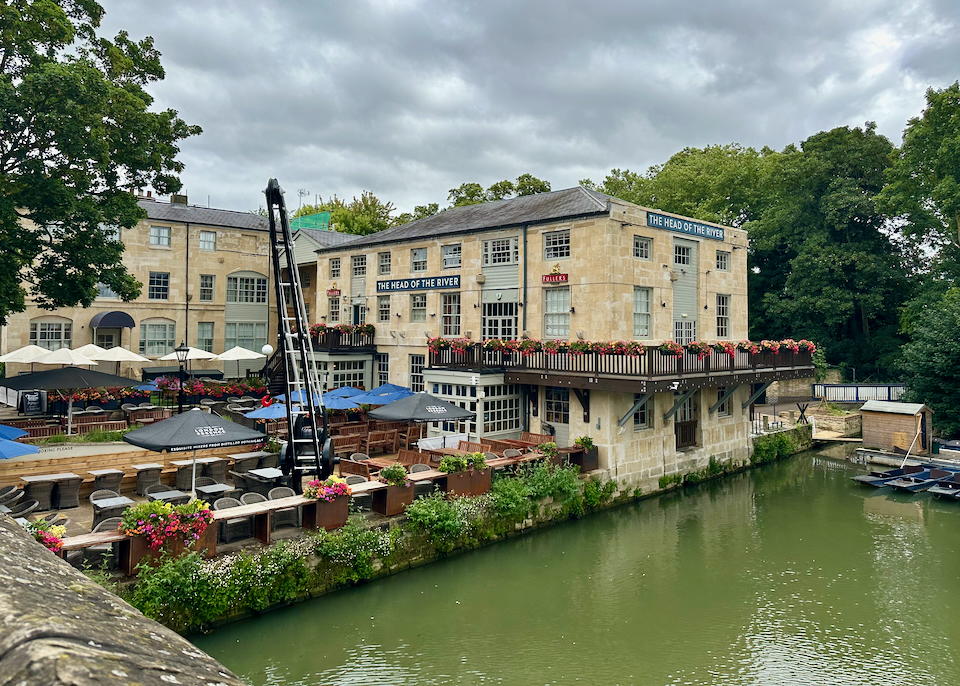
The Head of the River is one of our favorite boutique hotels in Oxford.
- Best Hotels: Head of the River • Old Bank Hotel • Vanbrugh House
- Best Cheap/Moderate Hotels: Tower House • Central Backpackers • Buttery
4. The High Street
High Street
The graceful curving High Street is packed with University colleges, including Brasenose, St Edmund Hall, All-Souls, Queen’s, and the confusingly named University College, but the top pick for most will be the beautiful 15th-century Magdalen College (pronounced ‘Maud-lin’), whose gorgeous grounds, which include a deer park, should be taken advantage of in good weather. Opposite the college is the University’s lush Botanic Garden & Arboretum – it’s the oldest in the UK and houses over 6,000 different plants across 130 acres.
Oxford Botanic Garden and Arboretum
Don’t miss the cluster of fairytale cobbled streets just south of the High Street with names like Magpie Lane and Logic Lane. They lead to Merton College, one of the original three colleges that made up the University (along with Balliol and University colleges) in the 13th century. Features to look out for include its quaint Mob Quad and chapel, the gargoyles adorning some of the buildings, and Merton Field behind the college that leads to Christ Church Meadow.
- Best Hotels: Old Bank • Museum Hotel
- Best Cheap/Moderate Hotels: Mercure Oxford Eastgate • Tower House
5. Ashmolean, Jericho, & Port Meadow
Ashmolean Museum
If you only visit one museum in Oxford, it should be the Ashmolean Museum of Art and Archaeology, just north of the City Center. It carries the weight of being Britain’s first public museum with ease, thanks to its awesome collection of world treasures from Ancient Egypt, China, Japan, and the Middle East, as well as awe-inspiring art from Goya, Manet, Michaelangelo, Raphael, Turner, and many more. Don’t miss its classy rooftop restaurant.
If you wander northeast of the museum, you’ll come to the neighborhood of Jericho, whose Little Clarendon and Walton streets are nice to wander about for the local vibes, with cute cafes, pubs, and restaurants. This was originally the industrial part of town, so it makes sense that the world-famous Oxford University Press, which has been printing books since the 16th century, is located here. It has a fascinating museum if you’re into books, typography, or Alice in Wonderland (by arrangement only).
The scenic riverside terrace at the Trout Inn.
One of Oxford’s strongest features is that it can be at once so urban and so rural. Nowhere is this more so than as Jericho ends and Port Meadow begins. The 440-acre plain is still common land for grazing animals, and you will see horses, cows, and sheep as you wander along the River Thames. A big draw is that you can start or end a walk here at The Trout or The Perch – historic inns with heavenly riverside terraces.
- Best Hotels: Old Parsonage • Vanbrugh House • Randolph
- Best Cheap/Moderate Hotels: Cotswold Lodge
6. Pitt Rivers Museum & Museum of Natural History
The Pitt Rivers Museum
North of Broad Street is the area of the University known as the Science Area, home to two of the city’s best museums, both cool for kids and adults alike. The Pitt Rivers Museum is undoubtedly one of the best museums not only in the UK but also in the world. Established by a Victorian collector, it is a fascinating romp through human psychology via displays grouping together objects from different time periods and cultures by use, such as drug paraphernalia, farming tools, warrior clothes, or body modification equipment from just about every inch of the planet.
Oxford University’s Museum of Natural History
Meanwhile, next door, the Museum of Natural History boasts a ‘skeleton parade’ of mammals throughout the ages, as well as the world’s best surviving dodo remains, dinosaur bones found in Oxfordshire, fossils, stuffed animals, gemstones, and more. There’s a cafe that overlooks it all, too, in the awesome atrium.
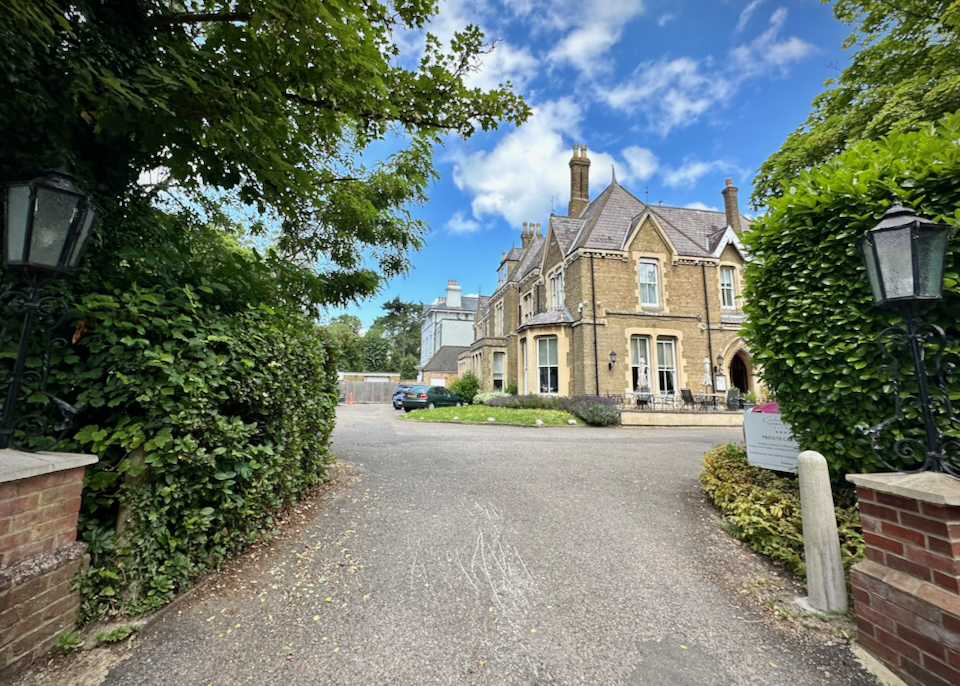
The Cotswold Lodge is an excellent, moderately-priced hotel with a great breakfast.
- Best Hotels: Old Parsonage • Vanbrugh House • Randolph
- Best Cheap/Moderate Hotels: Cotswold Lodge
7. University Parks & the River Cherwell
The River Cherwell
North Oxford’s geography has been determined by its rivers and by the University, which has stubbornly hung onto its open land and parks in spite of the ever-growing population. University Parks, northeast of the City Center, is one of the city’s most pleasant parks. The University turned it into a landscaped park in the 19th century with the aim of creating a space for “town” as well as “gown” – locals and students alike.
The Cherwell Boathouse
There are lots of different areas to explore, but one of the loveliest is the riverside walkway along the River Cherwell (pronounced ‘charwell’), one of the largest tributaries to the River Thames. JRR Tolkien lived not far north of University Parks, near the river in Summertown, and this may have influenced his descriptions of rivers in his Lord of the Rings series. The Cherwell Boathouse makes a great destination for a romantic riverside meal.
- Best Hotels: Old Parsonage • Vanbrugh House • Randolph
- Best Cheap/Moderate Hotel: Cotswold Lodge
8. Oxford Castle Quarter & Westgate Mall
Oxford Castle & Prison
To the west of the City Center is the re-branded Castle Quarter, whose major attraction is the Oxford Castle & Prison museum/experience which spans several significant historic sites: the Saxon-era St. George’s Tower, one of the oldest buildings in Oxford that affords 360-degree views; a 900-year-old crypt; an 18th-century prison; an 11th-century Motte-and-Bailey castle; and lots of folklore and local history along the way.
It’s easy to “do time” at the Malmaison Oxford; this portion of Oxford Castle & Prison used to house prisoners, but has since been converted to a luxury hotel.
Nearby is the new Westgate mall which promises to regenerate this often-overlooked section of the city by drawing crowds to its sleek passageways filled with cult and international brands.
- Best Hotels: Malmaison • Vanbrugh House
- Best Cheap/Moderate Hotels: Porterhouse Grill & Rooms • Central Backpackers
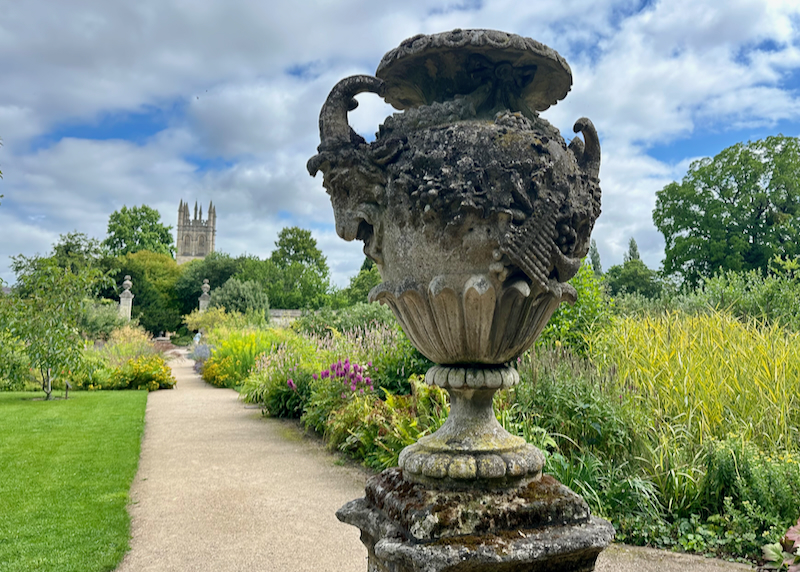

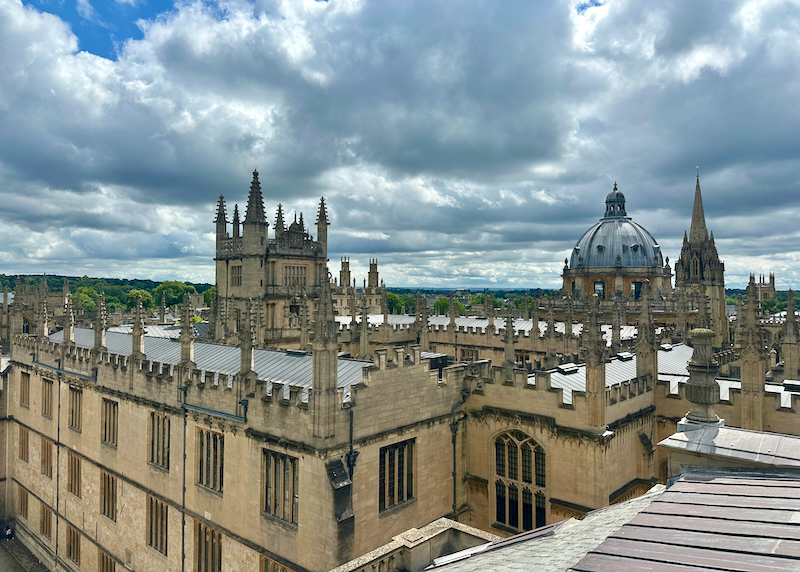
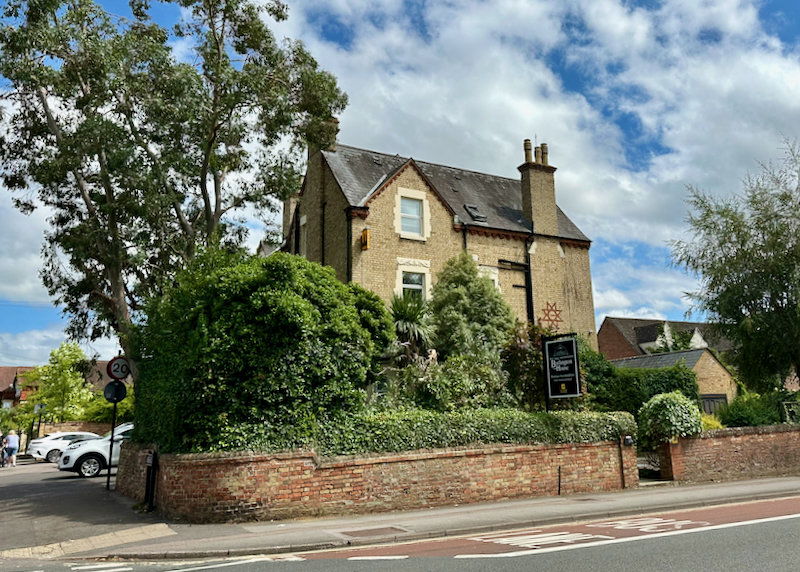
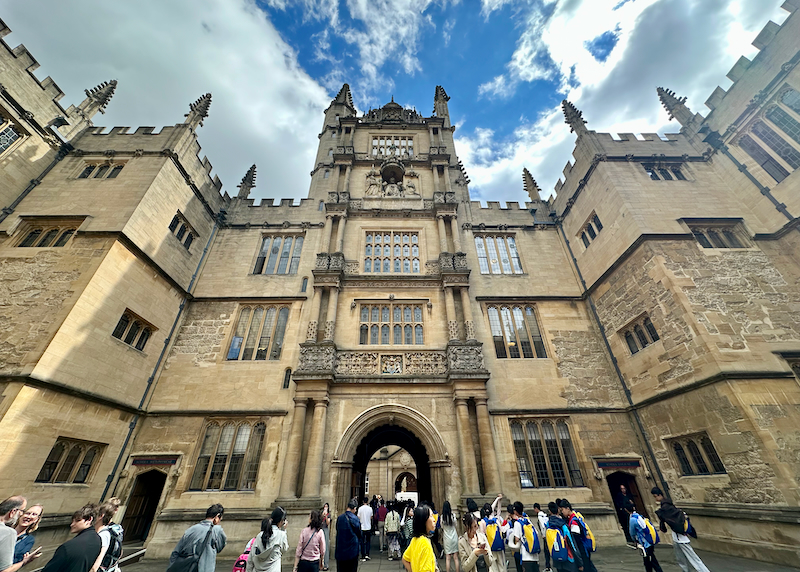
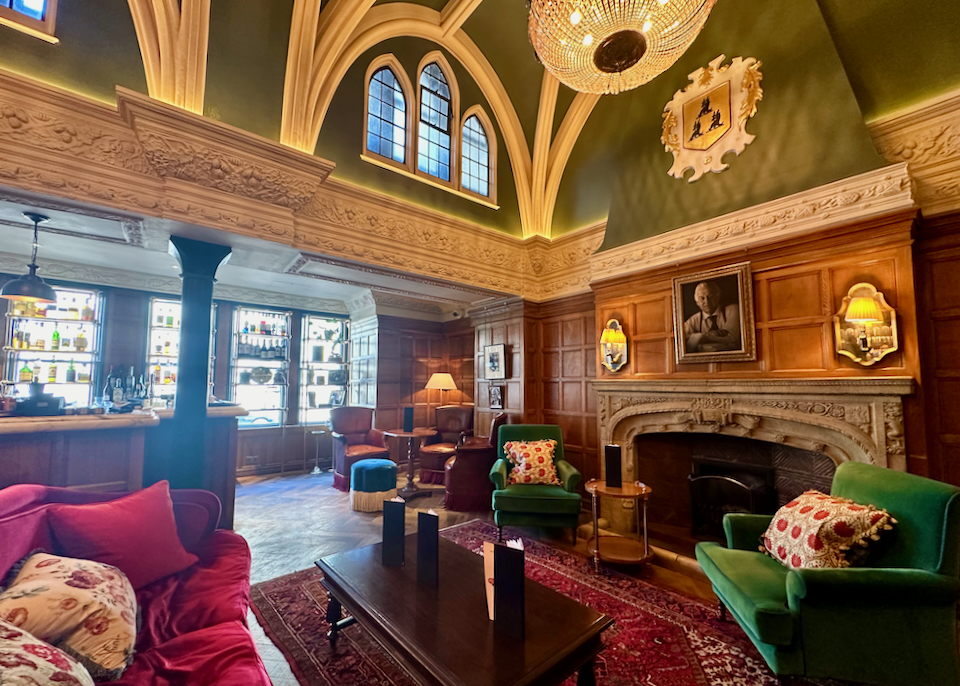
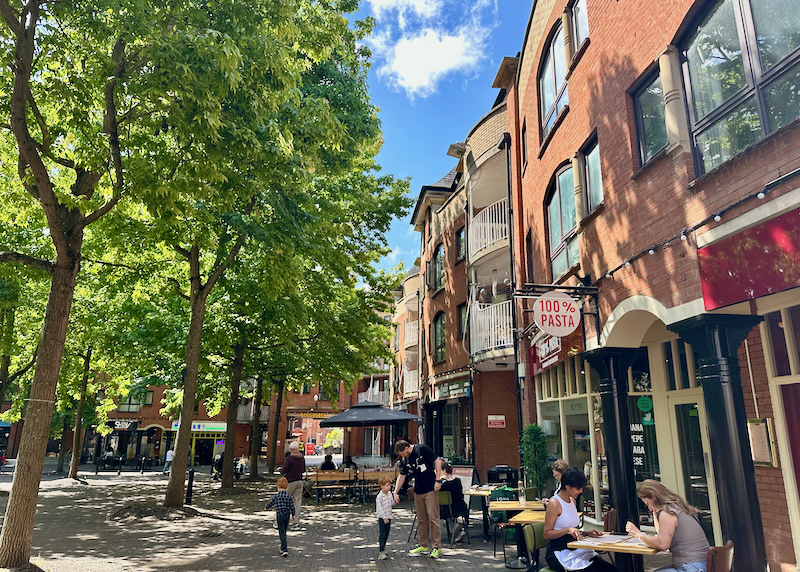

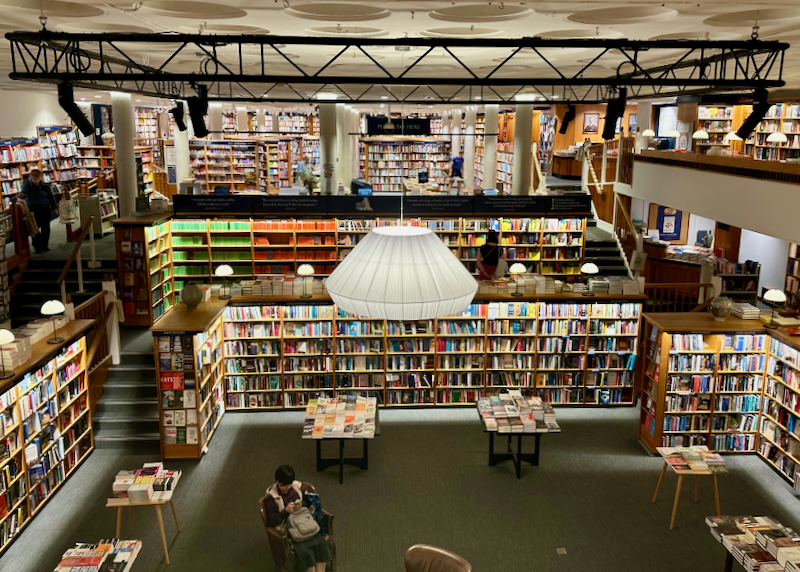
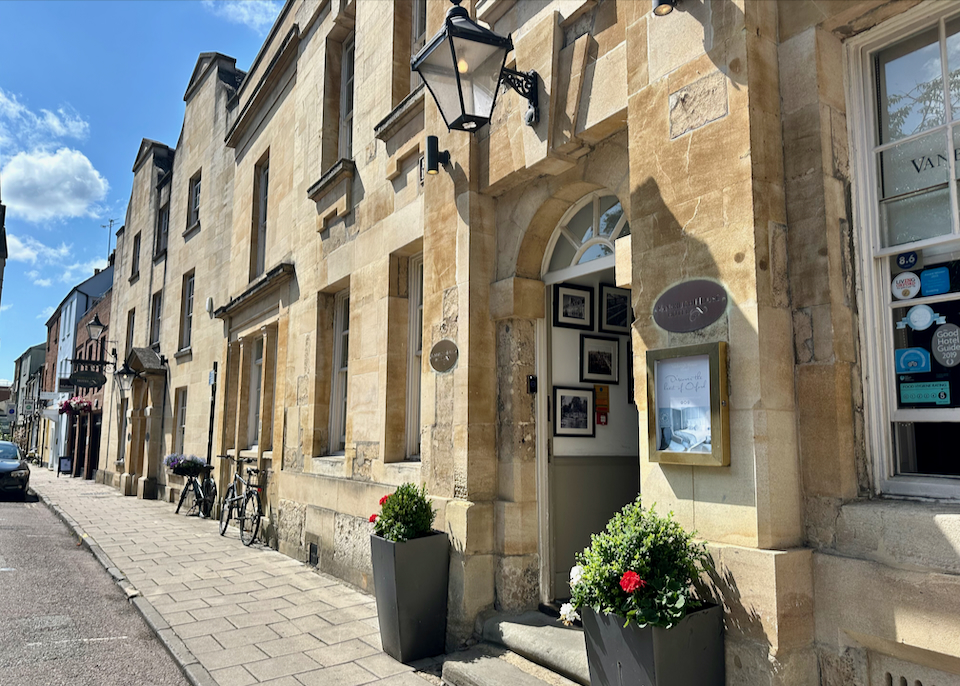
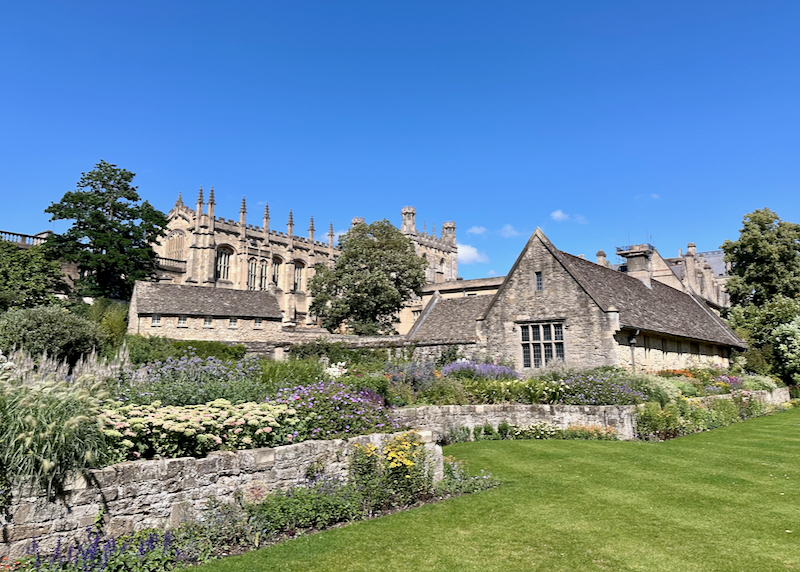
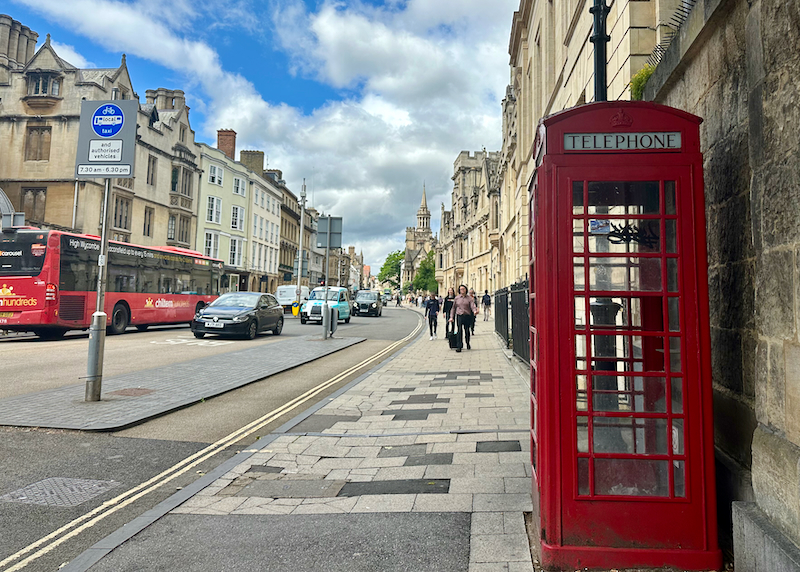
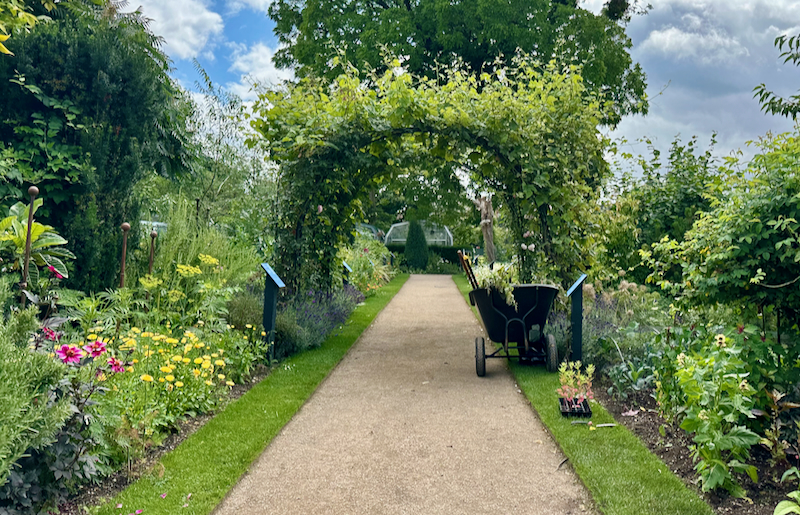
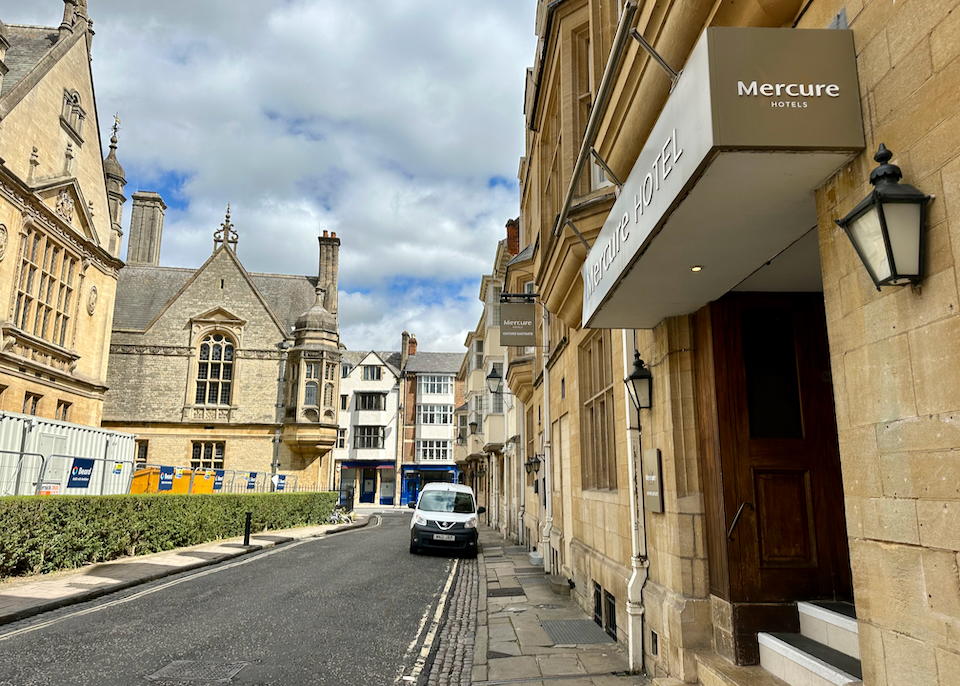
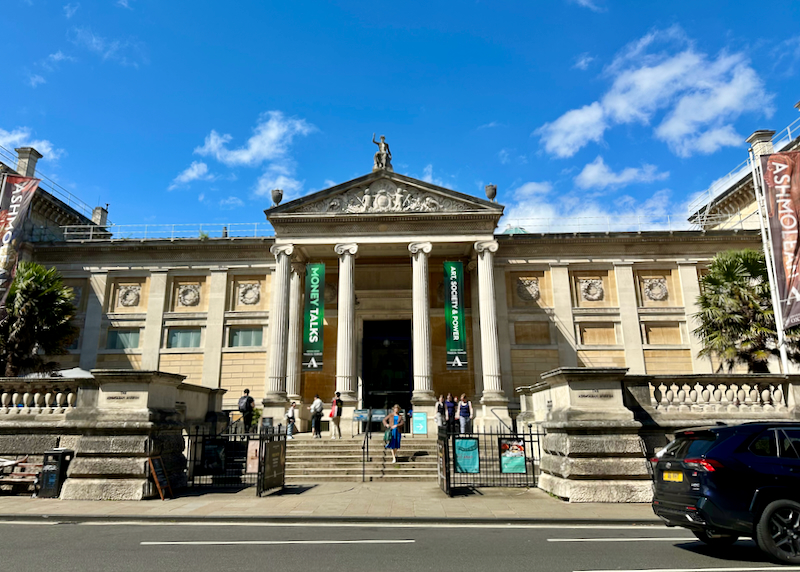
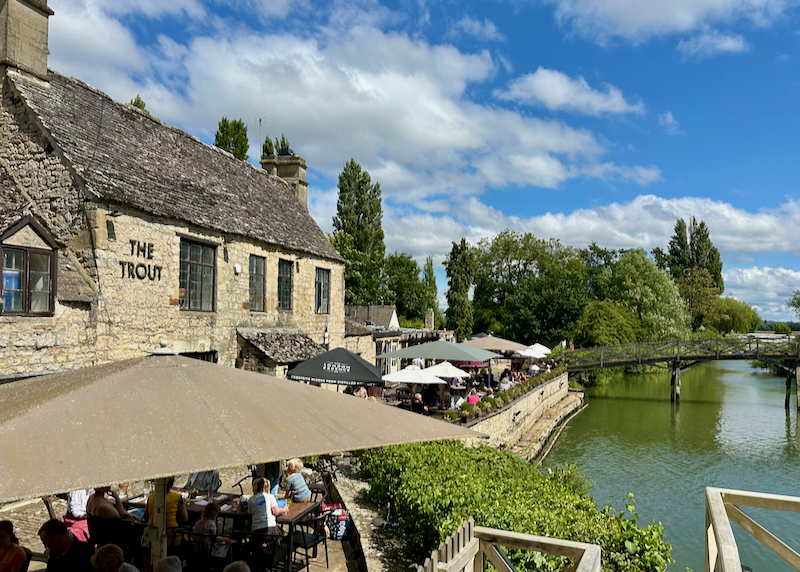
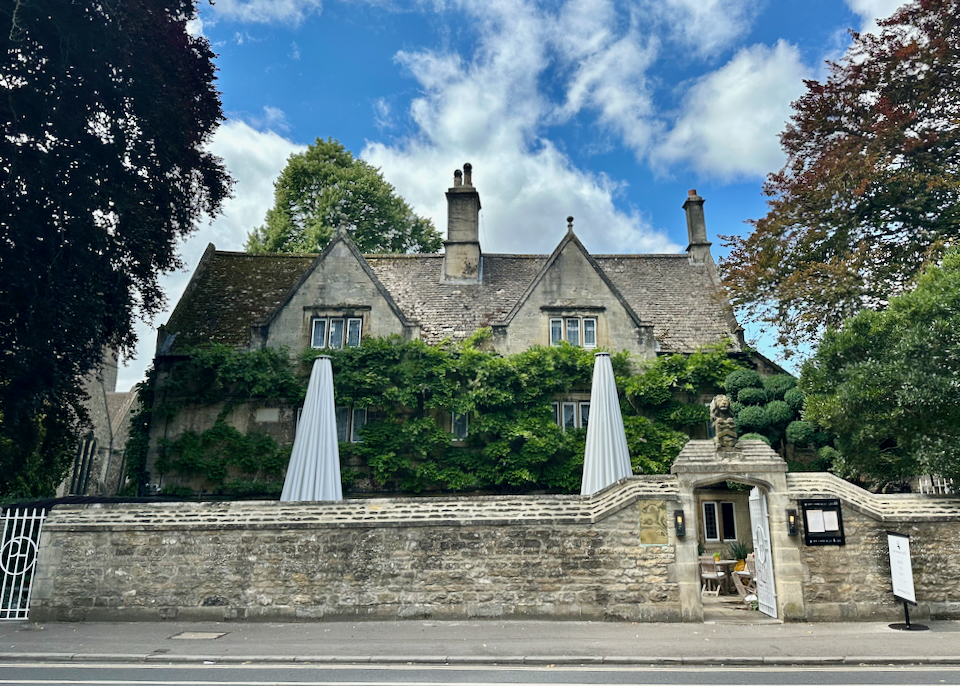
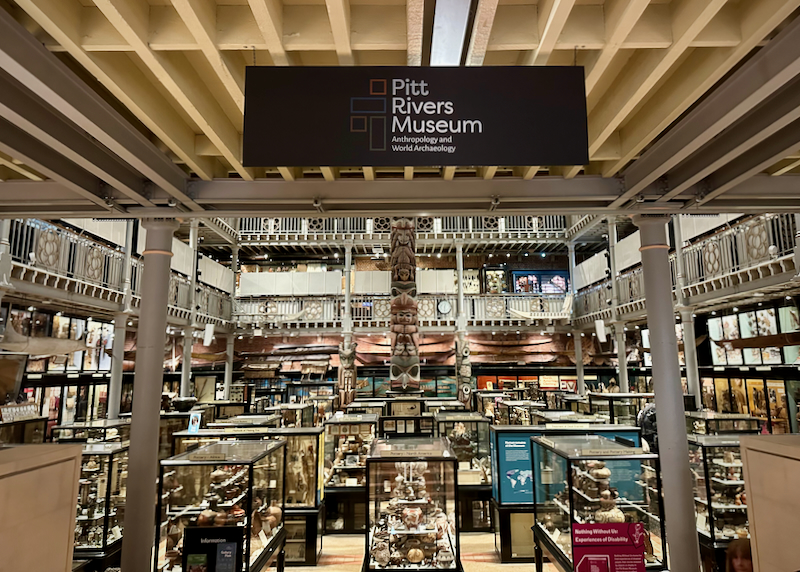
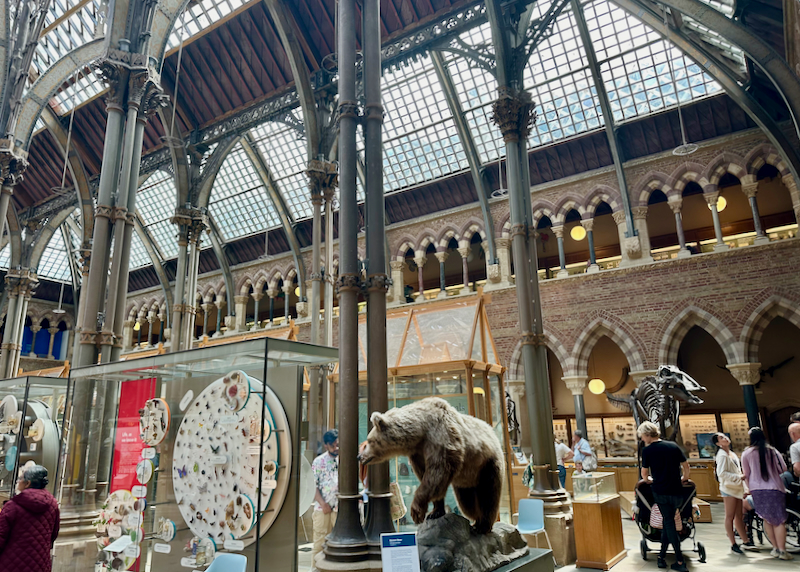
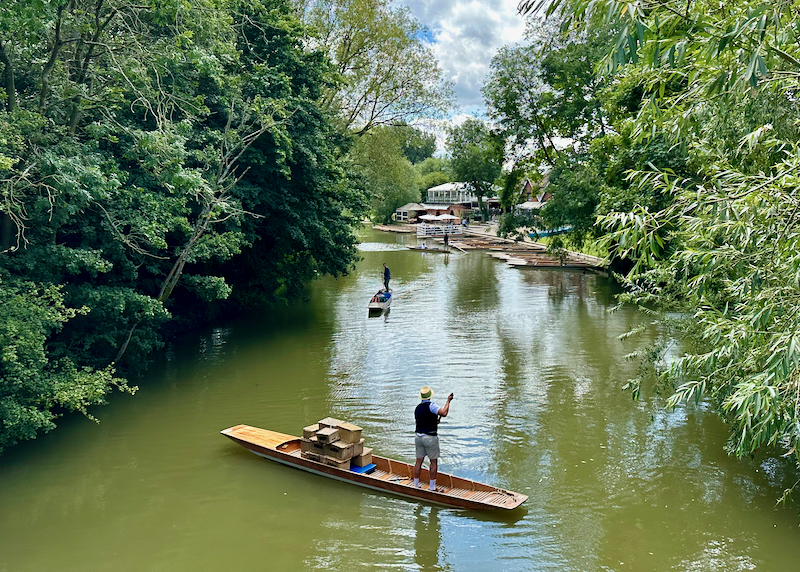
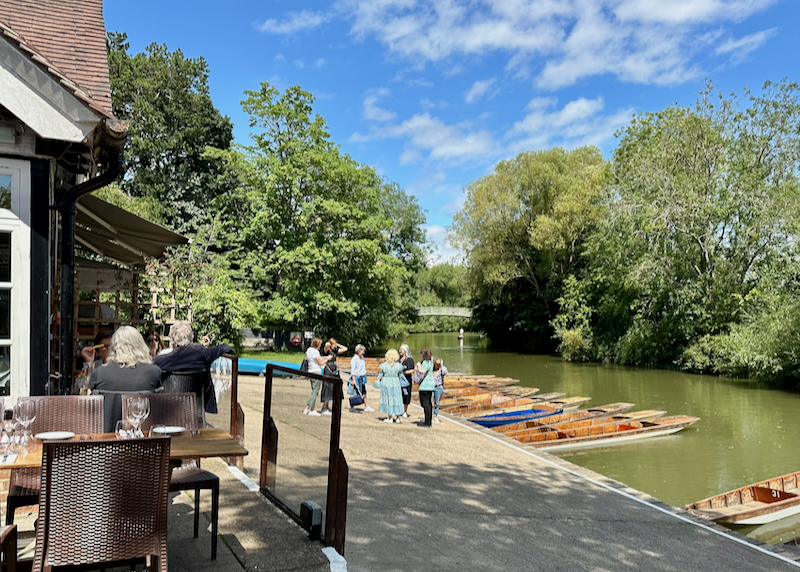
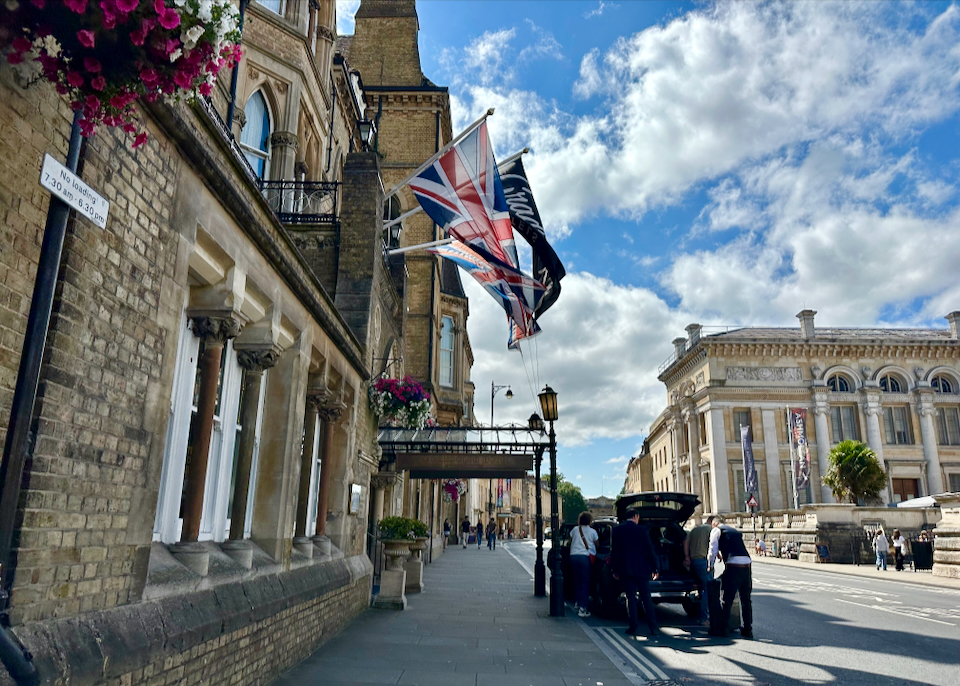
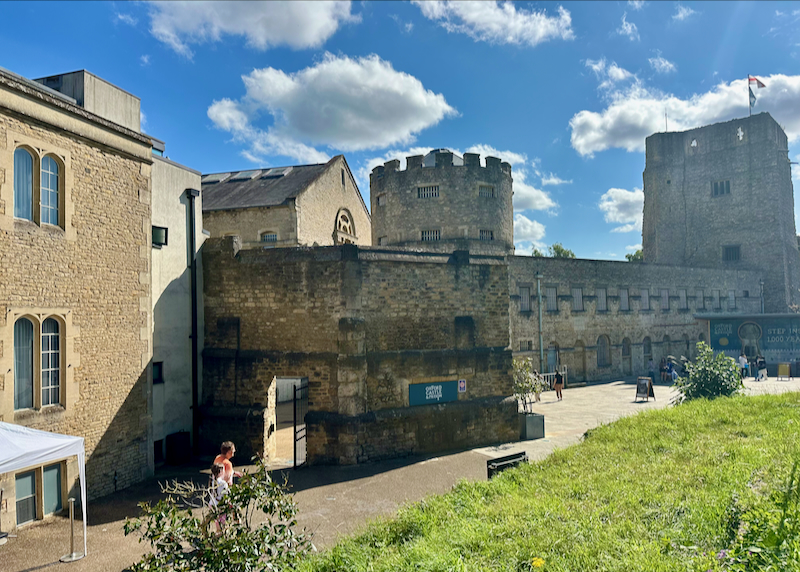
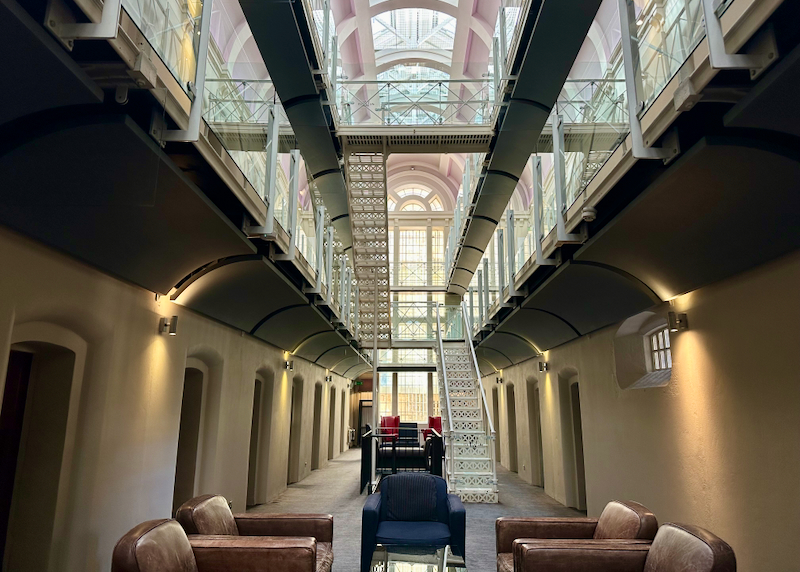
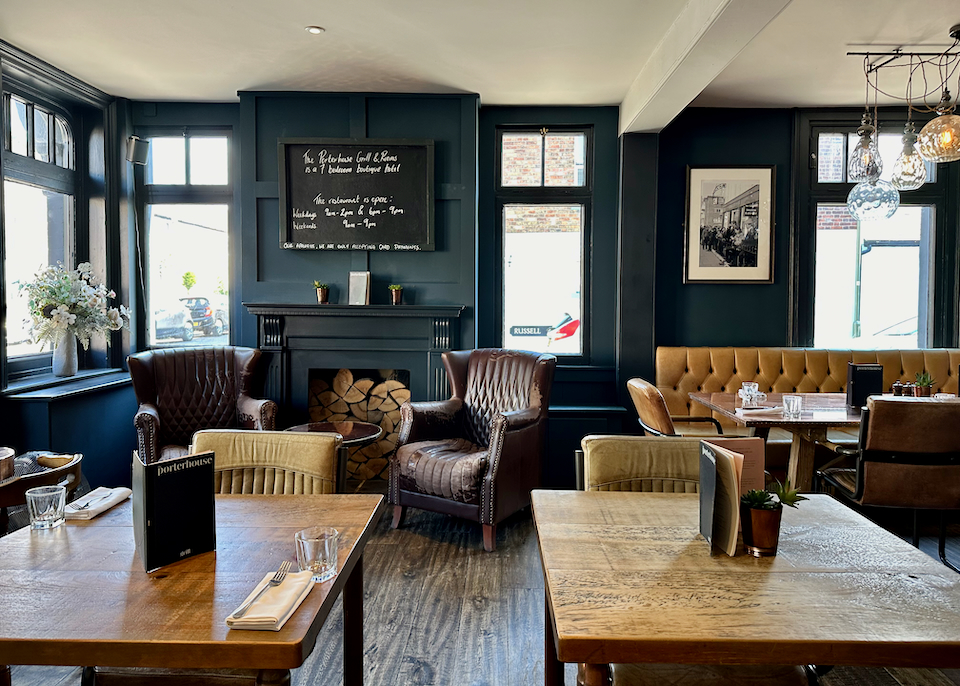
About Santorini Dave